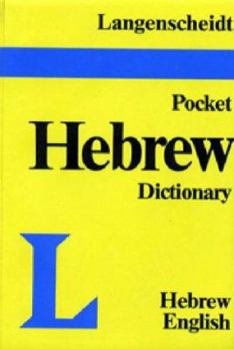Langenscheidt's Pocket Dictionary Hebrew
(Part of the Langenscheidt Pocket Dictionary Series)
Select Format
Select Condition 
Book Overview
A convenient reference for writers, students, and businesspeople;anyone who needs the right word at the right time. Poetry, prose, and a nine-letter pizza toping . . . When you're looking for a word,... This description may be from another edition of this product.
Format:Paperback
Language:English
ISBN:0887290825
ISBN13:9780887290824
Release Date:June 1965
Publisher:Langenscheidt Publishers
Length:432 Pages
Weight:0.63 lbs.
Dimensions:0.9" x 4.1" x 6.1"
Customer Reviews
4 ratings
Handy for travel
Published by Thriftbooks.com User , 16 years ago
This review is for 4 Hebrew lexicons in common use: Brown-Driver-Briggs, Koehler-Baumgartner, Holladay, and Langenscheidt. The sizeable Brown-Driver-Briggs lexicon is a development of Gesenius' historic work, and a long-time standard in English speaking countries. However, it has become dated, and now is used mostly because Hendrickson put out a cheaply constructed version keyed to Strong's concordance. Oxford's Clarendon Press edition is superior if you are required to get BDB. In addition, organizing entries by verbal root rather than alphabetically makes it difficult to use "BDB" for those without intimate knowledge of Hebrew. Fortunately, there is an alternative. The Koehler-Baumgartner lexicon is superb and thorough, and based on the latest Hebrew and Aramaic scholarship. The authors also took into account cognates from Ugaritic and Akkadian, so users of this massive work have a goldmine of information to draw from. By massive, I mean it is over 2000 pages in 2 large volumes. This plus its $190 asking price means it might be better to let the university or seminary library bear the brunt of purchasing and housing it unless you are an Old Testament specialist. Most readers will be best served by the work of William Holladay, a reasonably sized 426 pp lexicon based on the latest scholarship. Holladay abridged K-B by removing bibliographic references and other information most needed by specialists. It is well organized (alphabetically), and the font is clear. Entries also have references (not exhaustive) to use within the Old Testament, meaning it can be used as a poor man's OT concordance. While Holladay is manageably sized enough (9.75" x 6.875" x 1.25") to be pleasant to read and easily portable in a bookbag, it is not the smallest resource available. Some may be tempted to go a step further for the ultimate in compactness with the Langenscheidt pocket dictionary. This item is 6" x 4" x 1" and quite lightweight - in its 1959 iteration anyway. Its definitions are limited in scope and scholarly foundation, but still, what else fits in your coat pocket? My overall recommendation: Holladay for everyone, supplemented by Koehler-Baumgartner for those who need and can afford it. BDB: 3 stars K-B: 5 stars Holladay: 5 stars Langenscheidt: 4 stars
Unique
Published by Thriftbooks.com User , 22 years ago
This is useful in that it is a pocket sized dictionary of Biblical Hebrew, whereas most of that sort are large lexicons.
OK for portable reference
Published by Thriftbooks.com User , 22 years ago
It's small, it's not too hard on the eyes and it covers the vocabulary. Of course, you must know enough of the language to be able to find an entry. Not appropriate for exegesis papers, but useful for "quick" reading.
Great Pocket Resource
Published by Thriftbooks.com User , 23 years ago
This dictionary provides every lexiconical entry for the Hebrew Tanach. Each entry provides the various translations foudn in the Tanach for the entry. It also provides under each basic entry the meaning for the word as used in other forms, such as verb stems, nouns, participles, infinitives, adjectives, etc. Every form of the word that occurs in the Tanach is found in this resource. The only "basic" source I find more useful at times concerning the meanings of the words is the lexicon in the Strong' Concordance, which provides the basic meaning and nuances behind the Hebrew translation. An advantage of this pocket dictionary, on the other hand, is that it provides what Strong does not: the meanings as directly associated to particular grammatical forms of the word. For instance, Strong would state that the root meaning of "deep" as in "deep water" is "agitation." The root meaning for the word "sea" is "roar." This pocket dictionary does not speak concerning this. If one follows these words through the Old Testament, one finds that their "hidden" lexiconical meaning (the meaning that doesn't show up in translation) is very foundational to its contextual use. But Strong provides no meanings as associated with various grammatical uses of the words. For instance, the pocket dictionary under review would state that the word for "visit" means to have rule or charge over something in the Hifil stem. Strong gives no such associational comparisons of meaning as related to changes in grammatical use. I believe both resources, as basic resources, must be had by the Hebrew student. By having both, one gets what one could never have by only having one of these resources. This dictionary also provides meanings that books of Hebrew word lists do not provide.






